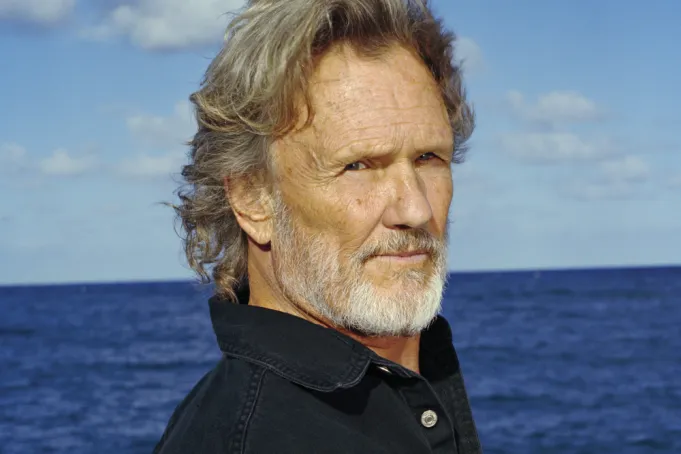Kris Kristofferson, who attained success as both a groundbreaking country music singer-songwriter and a Hollywood film and TV star, died Saturday at home in Maui, Hawaii. No cause of death was given, but he was described as passing away peacefully while surrounded by family. He was 88.
Said his family in a statement, “It is with a heavy heart that we share the news our husband/father/grandfather, Kris Kristofferson, passed away peacefully on Saturday, Sept. 28 at home. We’re all so blessed for our time with him. Thank you for loving him all these many years, and when you see a rainbow, know he’s smiling down at us all.” The statement was offered on behalf of Kristofferson’s wife, Lisa; his eight children, Tracy, Kris Jr., Casey, Jesse, Jody, John, Kelly and Blake; and his seven grandchildren.
Kyle Young, the CEO of the Country Music Hall of Fame and Museum, said, “Kris Kristofferson believed to his core that creativity is God-given, and that those who ignore or deflect such a holy gift are doomed to failure and unhappiness. He preached that a life of the mind gives voice to the soul, and then he created a body of work that gave voice not only to his soul but to ours. Kris’s heroes included the prize fighter Muhammad Ali, the great poet William Blake, and the ‘Hillbilly Shakespeare,’ Hank Williams. He lived his life in a way that honored and exemplified the values of each of those men, and he leaves a righteous, courageous and resounding legacy that rings with theirs.”
Kristofferson had already spent several modestly successful years in Music City’s song mills by the time he broke through as the author of such No. 1 country hits as “For the Good Times” (Ray Price, 1970), “Sunday Morning Coming Down” (Johnny Cash, 1970) and “Help Me Make It Through the Night” (Sammi Smith, 1971). His song “Me and Bobby McGee” became a posthumous No. 1 pop hit for his former paramour Janis Joplin in 1971.
His first four albums for Monument Records, which showcased his rough, unmannered singing and poetically crafted, proto-outlaw country songs, all reached the country top 10, and 1972’s “Jesus Was a Capricorn,” which contained his No. 1 country hit “Why Me,” topped the country LP chart. He won three Grammys: for best country song (“Help Me Make It Through the Night”) and a pair of duets with Rita Coolidge, to whom he was married from 1973-80.
During the ‘80s, he slowly regained his career footing. With Willie Nelson – who recorded a bestselling album of Kristofferson’s songs in 1979 – he co-starred in Alan Rudolph’s 1984 feature “Songwriter”; their collaborative song score received an Academy Award nomination.
In 1985, Kristofferson, Nelson, Johnny Cash and Waylon Jennings convened for the album “Highwayman,” a No. 1 country album that introduced the outlaw country supergroup. Ultimately known as the Highwaymen, the quartet issued two more popular albums in 1990 and 1995.
His film career continued apace, albeit in smaller roles; he ultimately tallied more than 100 movie and TV acting appearances. In 1996, he garnered strong reviews as a sadistic Texas lawman in John Sayles’ “Lone Star.” In 1998, he made the first of three appearances as vampire hunter Abraham Whistler opposite Wesley Snipes in the popular comic book franchise “Blade.”
After parting ways with Monument in the early ‘80s, Kristofferson recorded solo only sporadically. He nonetheless received strong reviews for three poignant and personal latter-day albums – “A Moment of Forever” (1995), “This Old Road” (2006) and “Closer to the Bone” (2009) – nakedly produced by Don Was. He issued 2013’s “Feeling Mortal” on his own KK Records imprint.
A 2004 inductee in the Country Music Hall of Fame, Kristofferson received a Lifetime Achievement Award from the Recording Academy in 2015.
At the time of the latter honor, his contemporary and friend Rodney Crowell wrote that Kristofferson had created “a narrative style that introduced intelligence, humor, emotional eloquence, spiritual longing, male vulnerability and a devilish sensuality – indeed, a form of eroticism – to country music.”
He was born June 2, 1936, in Brownsville, Texas. His father was a career Army Air Corps and Air Force officer, and his family moved frequently. He attended high school in San Mateo, Calif., where he proved both a strong student and a gifted athlete. He graduated summa cum laude with a degree in English from Pomona College and attended Oxford University in England as a Rhodes Scholar.
While in the U.K., Kristofferson cut his first records as Kris Carson. However, on returning to the U.S., he joined the army under pressure from his family. He ultimately attained the rank of captain, and was able to pilot a helicopter. However, on the eve of beginning an assignment to teach English at West Point, he left the army, and in 1965 he moved to Nashville to pursue music full-time. His family promptly cut ties with him.
Kristofferson scuffled in Music City for four years, working as a commercial chopper pilot and sweeping out Columbia Records’ local studio (where he reputedly first crossed paths with his future “Pat Garrett” co-star Bob Dylan, in town to record “Blonde on Blonde”). It took some convincing to get one of country music’s most prominent performers to pay attention to his songs, in an incident that became a Nashville legend.
Bob Dylan held Kristofferson in such high regard that he quoted “Sunday Morning Coming Down” at length in an unexpectedly long speech accepting an award from the Recording Academy’s MusiCares Foundation in 2015.

















